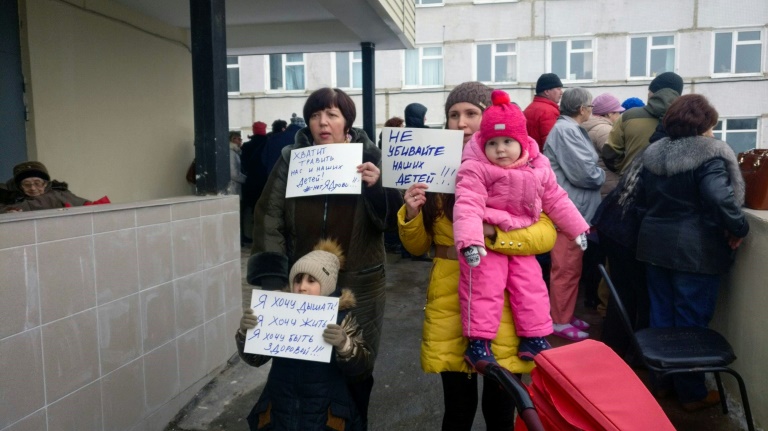Russia on Friday declared a "high alert" in a town where noxious fumes have leaked from a landfill site, distributing masks and respirators to residents who have held repeated protests.

The Kremlin said it was closely watching the situation in Volokolamsk, a town of around 20,000 people about 120 kilometres (75 miles) west of Moscow.
Residents have long demanded the closure of an ageing landfill site that has been emitting a noxious sulphurous smell, in a rare case of coordinated grass-roots civil action.
Last week, doctors treated dozens of children who complained of dizziness and nausea because of fumes from the Yadrovo landfill site near the town, which is in the Moscow region.
A spokesman for the regional emergencies ministry said “a state of high alert” had been imposed in the town and that monitoring of the environment “will be stepped up” with the “non-stop” testing of air quality.
Local authorities had also begun distributing medical masks and respirators to those who needed them, he said.
“We are in constant touch with the regional authorities and the government over this,” President Vladimir Putin’s spokesman Dmitry Peskov told reporters.
“Everyone understands that this is a complicated problem, that it cannot be solved overnight.”
The emergencies ministry said there was no need to evacuate residents and that on Friday air pollution did not exceed permissible limits.
Officials promised to stop up the landfill by the end of the month and install a decontamination system in June, until a new facility is eventually built.
– System is failing –

Local residents of Volokolamsk hold placards, one reading “Don’t kill our kids!”, and gather outside the local hospital on March 21, 2018
Thousands of Volokolamsk residents on Thursday held a rally demanding that the authorities formally declare a state of emergency, which they have not so far done.
Another rally is planned for Sunday.
Demonstrations demanding the closure of landfill sites have also been held in several other cities of the Moscow region.
In Kolomna, a pretty historic city of some 140,000 inhabitants about 100 kilometres (60 miles) southeast of Moscow, more than 100 protesters last week attempted to block a road used by lorries taking rubbish to a landfill site.
Police briefly detained some 30 participants on Wednesday and charged three of them with breaches of the peace and disobeying law enforcement forces, said OVD-Info rights group that specialises in monitoring detentions of political activists.
“We’re treated like second-class citizens,” an angry protester told a local official in video footage posted online.
“Why are we (treated) worse than others? Why are we (treated) worse than Muscovites?” the woman asked.
In other cities close to the Russian capital such as Klin northeast of Moscow, locals have also expressed concerns over the state of landfill sites.
The growing public discontent throughout Russia has forced the authorities to acknowledge problems including the lack of an adequately funded and equipped service to monitor air quality around the country.
Russia sends almost all its rubbish to landfill and there is no obligation for people to recycle household waste, creating a growing problem despite the country’s vast territory.
Support Local Journalism
Add The Citizen as a Preferred Source on Google and follow us on Google News to see more of our trusted reporting in Google News and Top Stories.






